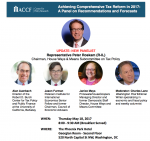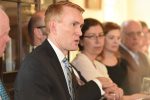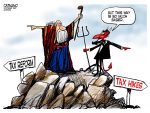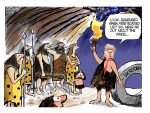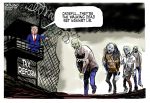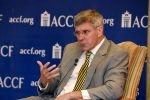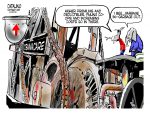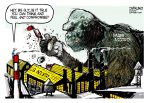ACCF
Update: Chairman Roskam (R-IL) joins ACCF 5/18 tax reform event
Join us for an engaging discussion on tax reform with Chairman Peter Roskam of the House Ways and Means Subcommittee on Tax Policy, who...
ACCF Salon: “Where Goeth Tax Reform in 2017?”
The May 3rd ACCF Economic Policy Evening focused on tax reform in the 115th Congress. Attendees offered policy analysis and political forecasts to the...
Business Groups Urge Treasury to Withdraw Sec. 385 Tax Regulations
The American Council for Capital Formation joined the Business Roundtable and other business groups this week in urging Treasury Secretary Steven Mnuchin to withdraw the final Section 385 regulations issued in October 2016. These regulations will impose excessive and unwarranted compliance and financial burdens on businesses operating in the United States, distorting investment and other business decisions, to the detriment of U.S. jobs.
Congress’ next 100 days: Small businesses need regulatory relief
As the nation evaluates the new President’s First 100 Days and Washington looks ahead to the next 100, we must ask a simple question, do we want vibrant small businesses in America or not?
The complexity and cost of the regulatory burden placed on each small business show the evidence of our answer. When the regulatory burden drowns out productivity and innovation, the flowery rhetoric we often hear from politicians about small businesses is seen for what it is: lip service. When each new idea in business is met with an unforgiving mountain of requirements, regulations, and forms, the staff of a small florist, restaurant, or pet store spends less time on the core mission of the company and more time on compliance.
Congress Members Urge Trump to Re-Work Paris Agreement
Published on FoxBusiness.com
The group (of Republican congressmen) adds that a recent report by the American Council for Capital Formation, for example, “found achieving this pledge would reduce our gross domestic product by $250 billion by 2025 and reduce economy-wide employment by 2.7 million jobs.”
The group (of Republican congressmen) adds that a recent report by the American Council for Capital Formation, for example, “found achieving this pledge would reduce our gross domestic product by $250 billion by 2025 and reduce economy-wide employment by 2.7 million jobs.”
ACCF Salon: Improving the Regulatory System
On Wednesday, April 26 the ACCF hosted an Economic Policy Salon on "Improving the Regulatory System." Washington leaders from the energy, manufacturing, financial and retail sectors joined members of Congress and leading journalists for a robust, off-the-record discussion on potential ways to reshape the federal regulatory state to make it more efficient and less burdensome to businesses without diminishing public health and safety benefits.
Taxpayers Expect Washington to Fix Broken Tax Code
Now that Tax Day has arrived, it’s time for Congress to get serious about reform.
Jason Furman, Former CEA Chairman, Joins ACCF Center Board of Scholars
Washington, DC – The American Council for Capital Formation Center for Policy Research announced today that Jason Furman, the former Chairman of President Obama’s...
Steve Moore, Former Wall Street Journal Editorial Writer, Joins ACCF Board of Advisors
The American Council for Capital Formation (ACCF) announced today that Steve Moore, Senior Economic Advisor to the Trump Presidential Campaign has joined the ACCF Board of Advisors. Moore is the Distinguished Visiting Fellow for Project for Economic Growth at The Heritage Foundation. He is also a former member of the Wall Street Journal editorial board and a long-time expert on tax and economic policy in Washington.
Small firms seek level playing field in tax reform
Published in USA Today
The varying rates of tax cuts for corporations and pass-throughs in the Ryan plan have become a rallying cry for smaller firms. “You can’t have a tax reform that favors one type of business,” says Pinar Cebi Wilber, a senior economist at the American Council for Capital Formation, a pro-business group. "We should have an overall business tax reform."
The varying rates of tax cuts for corporations and pass-throughs in the Ryan plan have become a rallying cry for smaller firms. “You can’t have a tax reform that favors one type of business,” says Pinar Cebi Wilber, a senior economist at the American Council for Capital Formation, a pro-business group. "We should have an overall business tax reform."
Impacts of Greenhouse Gas Regulations on the Industrial Sector
While the regulatory approach to reducing greenhouse gas (GHG) emissions in the United States has largely focused on the power and transportation sectors, it’s clear that substantial reductions by the industrial sector would be needed to meet President Obama’s pledge under the Paris Agreement. This report by the ACCF Center for Policy Research and the U.S. Chamber of Commerce Institute for 21st Century Energy summarizes a study conducted by NERA Economic Consulting on the potential impacts to the U.S. economy of regulating industrial sector GHG emissions.


